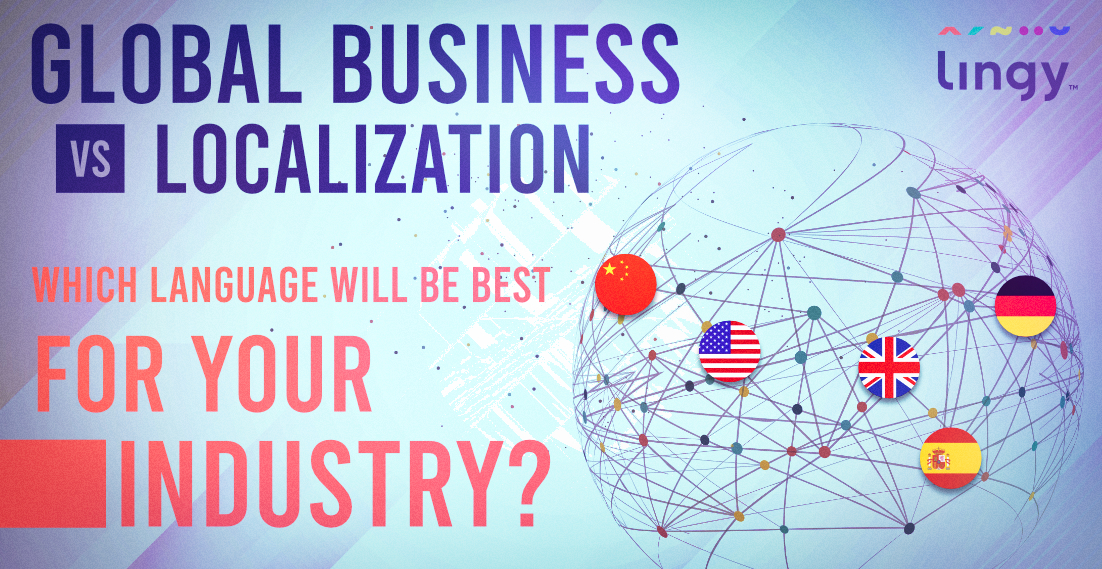Global business vs localization – which language will work best for your industry?

Today’s world, which is developing following the trends coming with new technologies and with cooperation of international organisations, has no borders. Knowledge of languages simplifies communication on many levels – it is often enough to know English to communicate with your recipient. In business, however, it is worth paying attention to what is regional.
If you want to grow your business in other countries, you will need to adapt your communication language to the audiences and web users there. Speaking to a potential customer in their language will increase the chance of a successful transaction. The recipient will feel understood and noticed. This is possible thanks to the use of language localization rules, which seems to be one of the basic determinants of any global business strategy.
We provide translation services for companies
What is language localization?
A simple translation prepared by a freelancer is often not enough to conquer global markets. Several language versions of a website generated by automatic plugins may also not be enough to ensure success. Particularly when planning e-commerce development and expansion into foreign markets, care should be taken to ensure that an online shop is properly translated – whether it is product descriptions, services or tailoring blog content to a particular country or region. For this purpose, the rules of language localization are applied.
It is not the translation alone, but also the interpretation of the content. Localization covers all the preferences of a given region. A native speaker prepares content in accordance with the culture of the specific area or applicable law.
E-commerce promotion – how to reach a larger audience?
CSA Research studies leave no doubt –75% of consumers shopping online choose a shop with content prepared in their native language. Localization is therefore very important when it comes to marketing. Appropriately tailored content will attract the attention of foreign customers.
Planning marketing content both on the shop’s website and in social media should not only consist in translating content from the the source language into the language of the selected country. Indeed, a lack of localization can generate errors and in some cases even offend the recipient. In such a case you can forget about a successful transaction.
Appropriate market penetration, understanding the needs of the local target group will make it possible to adjust the text or graphics to the reality of the recipients. Ensure proper product naming, slogans or taglines. Thanks to this, advertising campaigns will be more effective – the customer will have a sense of understanding, will remember the message better and will feel respected by the creators of a given online shop. And this is the first step to a successful sales transatcion.
Which language should you choose to translate content that will reach global markets?
You already know how content localization works. The next question that naturally pops into your head is the one about choosing the language. Should content always be translated into English? What about other languages, which also, especially in the sphere of technology, have universal significance?
The choice of the language of localization in the e-commerce world or the new technology industry, which seems natural, is most often dictated by demographic data and the demand for a given language. If you want your e-shop to make a name for itself in a particular part of the world, it makes sense to choose a language that is universal for a given region.
Often, the factor determining the choice of language is the question of the price of the translation and the localization service associated with it. This is because the service may require access to specific tools and the availability of qualified translators, whose rates, in the case of rarely used languages, may simply be higher.
E-commerce translation – the most popular languages
Global companies operating in the world of new technologies, often base their activities on the five most popular languages. Get to know them and consider whether they also fit your industry and expansion direction.
- English – the international language of business and the primary language of communication worldwide. Its versatility allows the creation of marketing campaigns with international reach. As a result, it is often chosen by e-commerce environments and other online businesses. When choosing English, the region should be kept in mind when localizing content. Indeed, there are differences between American, British or Australian English.
- Chinese – the most widely spoken language in the world. It is essential for companies looking to expand in Asian markets. There are linguistic nuances depending on the region – in the case of Chinese, localization is also important.
- Spanish – considered the second most popular language in the world. Used on several continents, it requires a different localization approach depending on the business destination.
- Arabic – most often chosen by companies that dream of conquering the markets of the Middle East and North African countries. It has many dialects and variations, hence the need to localize content according to the specific region and the type of content to engage the audience.
- German – considered to be the most widely spoken language in the countries of the European Union. Essential for companies planning to expand on the European continent. Several variations (depending on the country in which it is used) require appropriate translation in terms of e-commerce or marketing content.
Localization and translation in one place – we will help you enter global markets
You already know what language localization is and what factors influence the choice of the target language. Which will suit your industry best? Do not choose a random one based ona country on a map. Analyse the global market as well as the situation in the particular market you intend to conquer. Examine the audience and take care of appropriate marketing. Only with specific data and prepared plans can you proceed to the localization of the content.
When deciding on the translation services of our agency, you can be sure of appropriate translation of content used in e-commerce. Using translation tools, we offer a machine translation service with post-editing. Proofreading of texts translated by the systems makes it possible to verify the linguistic and contextual correctness. We also offer sworn translation services, which can be essential in the formal aspects related to the global development of your company.
We will be happy to accompany you at every stage of the global operation of your shop or other type of business.
Read more about foreign markets:
Why are advertising campaigns not effective? 3 reasons related to the challenges of marketing translations
Learn about the 3 causes of ineffective advertising campaigns related to marketing translations.
Transliteration – translation challenges not only in the logistics industry
A mistake made due to a incorrect translation or rather transliteration can lead to serious operational and legal consequences, as we discuss below.
How to publish a book? Translation tips and more
How can you publish your own book? Before you make a decision, get to know the advantages and disadvantages of the proposed solutions, including in the context of possible book translation.
Website translation – a proposal for Women’s Day not only for e-commerce
The upcoming Women’s Day is the perfect opportunity to plan special marketing campaigns to reach new audiences. E-commerce companies are keen to introduce dedicated offers during this period. They also decide to expand abroad to tap the potential of international markets, also on everyday basis, outside special holiday periods. In this context, website translation plays a key role.



